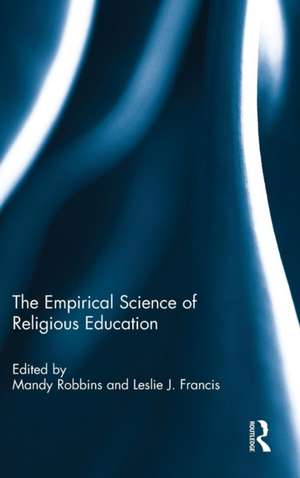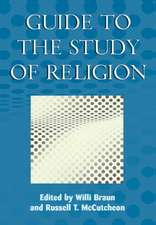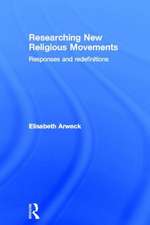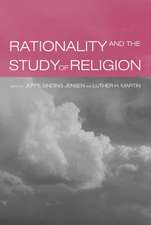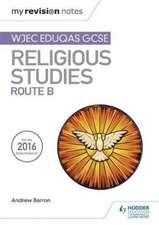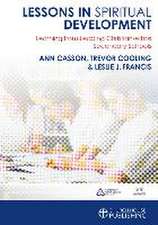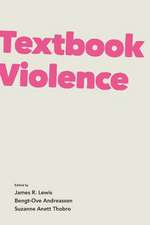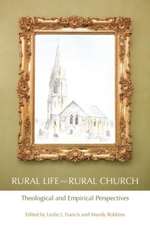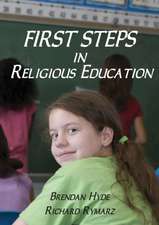The Empirical Science of Religious Education
Editat de Mandy Robbins, Leslie Francisen Limba Engleză Hardback – 28 ian 2016
The volume draws together, organises and illustrates the contours of this emerging field and is an essential compendium which covers work in:
- teacher education and teacher experience;
- student understanding, attitudes and values;
- varieties of religious schooling, and;
- worldview and life interpretation
It is an essential resource for those practitioners and researchers who wish to access original and innovative research undertaken by way of ethnographic fieldwork, practitioner research, life-history approaches to research, psychological scales and measures, and large surveys. Particularly interested readers will be studying PGCE and masters level programmes in religious education, as well as qualified religious educators undertaking continuing professional development.
Preț: 703.79 lei
Preț vechi: 858.28 lei
-18% Nou
Puncte Express: 1056
Preț estimativ în valută:
134.67€ • 140.60$ • 111.46£
134.67€ • 140.60$ • 111.46£
Carte tipărită la comandă
Livrare economică 05-19 aprilie
Preluare comenzi: 021 569.72.76
Specificații
ISBN-13: 9781138929852
ISBN-10: 1138929859
Pagini: 316
Dimensiuni: 156 x 234 x 15 mm
Greutate: 0.54 kg
Ediția:1
Editura: Taylor & Francis
Colecția Routledge
Locul publicării:Oxford, United Kingdom
ISBN-10: 1138929859
Pagini: 316
Dimensiuni: 156 x 234 x 15 mm
Greutate: 0.54 kg
Ediția:1
Editura: Taylor & Francis
Colecția Routledge
Locul publicării:Oxford, United Kingdom
Public țintă
Postgraduate and ProfessionalCuprins
Contents
Preface
Foreword
Acknowledgements
Introducing the empirical science of religious education
Part 1. Ethnographic fieldwork
1.1 Bridging the gap between young people’s experience of their religious traditions at home and school: The contribution of ethnographic research
Eleanor Nesbitt
1.2 Issues in the delivery of religious education to Muslim pupils: Perspectives from the classroom
Julia Ipgrave
Part 2. Practitioner research and community of practice
2.1 Researching religious education pedagogy through an action research community of practice
Kevin O’Grady
2.2 ‘I’m less intolerant’: Reflexive self-assessment in religious education
Nigel Fancourt
Part 3. Educating religious educators
3.1 Becoming an RE teacher: A life history approach
Pat Sikes and Judith Everington
3.2 The experience of Black African religious education trainee teachers training in England
Nick Mead
Part 4. Students imaging beginnings and endings
4.1 Children’s concepts of an afterlife
Sandra Frangoulis, Netta Jordan and Richard Lansdown
4.2 Insights from children’s perspectives in interpreting the wisdom of the biblical creation narrative
Howard Worsley
Part 5. In search of meaning and purpose
5.1 Weaving the threads of meaning: A characteristic of children’s spirituality and its implications for religious education
Brendan Hyde
5.2 Exploring the role of religion and spirituality in the development of purpose: Case studies of purposeful youth
Kirsi Tirri and Brandy Quinn
Part 6. Life world and life interpretation
6.1 Islamic nature and identity management: The lifeworld of Pakistani children in Norway
Sissel Östberg
6.2 Life interpretation and religion among Icelandic teenagers
Gunnar J. Gunnarsson
Part 7. Religious schooling
7.1 Islamic schools in The Netherlands: Compromising between identity and quality? Geert Driessen and Pim Valkenberg
7.2 The case of the Jewish high school in Berlin: A denominational school dealing with diversity
Christine Mueller
Part 8. Developing scales and measures
8.1 The Loman Index of Biblical interpretation: Distinguishing between literal, symbolic and rejecting modes among 11 to 14 year olds
Susan E. Loman and Leslie J. Francis
8.2 Internal consistency reliability and construct validity of the Attitude toward Muslim Proximity Index (AMPI): A measure of social distance
Adrian Brockett, Andrew Village and Leslie J. Francis
Part 9. Shaping and testing theories
9.1 Promoting positive attitudes towards science and religion among sixth-form pupils: Dealing with scientism and creationism
Jeff Astley and Leslie J. Francis
9.2 Personality, conventional Christian belief and unconventional paranormal belief: A study among teenagers
Leslie J. Francis, Emyr Williams and Mandy Robbins
Part 10. Large scale surveys
10.1 A nine-country survey of youth in Europe: Selected findings and issues
William K. Kay and Hans-Georg Ziebertz
10.2 The teenage-religion and values survey in England and Wales: An overview
Mandy Robbins and Leslie J. Francis
Contributors
Preface
Foreword
Acknowledgements
Introducing the empirical science of religious education
Part 1. Ethnographic fieldwork
1.1 Bridging the gap between young people’s experience of their religious traditions at home and school: The contribution of ethnographic research
Eleanor Nesbitt
1.2 Issues in the delivery of religious education to Muslim pupils: Perspectives from the classroom
Julia Ipgrave
Part 2. Practitioner research and community of practice
2.1 Researching religious education pedagogy through an action research community of practice
Kevin O’Grady
2.2 ‘I’m less intolerant’: Reflexive self-assessment in religious education
Nigel Fancourt
Part 3. Educating religious educators
3.1 Becoming an RE teacher: A life history approach
Pat Sikes and Judith Everington
3.2 The experience of Black African religious education trainee teachers training in England
Nick Mead
Part 4. Students imaging beginnings and endings
4.1 Children’s concepts of an afterlife
Sandra Frangoulis, Netta Jordan and Richard Lansdown
4.2 Insights from children’s perspectives in interpreting the wisdom of the biblical creation narrative
Howard Worsley
Part 5. In search of meaning and purpose
5.1 Weaving the threads of meaning: A characteristic of children’s spirituality and its implications for religious education
Brendan Hyde
5.2 Exploring the role of religion and spirituality in the development of purpose: Case studies of purposeful youth
Kirsi Tirri and Brandy Quinn
Part 6. Life world and life interpretation
6.1 Islamic nature and identity management: The lifeworld of Pakistani children in Norway
Sissel Östberg
6.2 Life interpretation and religion among Icelandic teenagers
Gunnar J. Gunnarsson
Part 7. Religious schooling
7.1 Islamic schools in The Netherlands: Compromising between identity and quality? Geert Driessen and Pim Valkenberg
7.2 The case of the Jewish high school in Berlin: A denominational school dealing with diversity
Christine Mueller
Part 8. Developing scales and measures
8.1 The Loman Index of Biblical interpretation: Distinguishing between literal, symbolic and rejecting modes among 11 to 14 year olds
Susan E. Loman and Leslie J. Francis
8.2 Internal consistency reliability and construct validity of the Attitude toward Muslim Proximity Index (AMPI): A measure of social distance
Adrian Brockett, Andrew Village and Leslie J. Francis
Part 9. Shaping and testing theories
9.1 Promoting positive attitudes towards science and religion among sixth-form pupils: Dealing with scientism and creationism
Jeff Astley and Leslie J. Francis
9.2 Personality, conventional Christian belief and unconventional paranormal belief: A study among teenagers
Leslie J. Francis, Emyr Williams and Mandy Robbins
Part 10. Large scale surveys
10.1 A nine-country survey of youth in Europe: Selected findings and issues
William K. Kay and Hans-Georg Ziebertz
10.2 The teenage-religion and values survey in England and Wales: An overview
Mandy Robbins and Leslie J. Francis
Contributors
Recenzii
Brian Gates:
‘The book is a well-focussed collation of some 20 articles selected from an available 100. This is sufficiently manageable in number not to be ‘swamping’ but sufficiently varied to be enticing of interest. The 10 organising themes are also well-chosen to be indicative of the ground represented. There is no comparable resource available, save for the journal itself. Any weaknesses are external to the proposal and relate to market predictability and affordability by individuals.
Leslie Francis is a senior authority in this field and recognised internationally as such. This is true with regard to his own research and publications, and also in regard to his direct association with both the BJRE and the Warwick RE Research Unit. Mandy Robbins has collaborated closely with him over the last decade and has gained recognition in related national and international associations. The choice of contributors is entirely apposite for the focus of the book – they cover the field under scrutiny and themselves come from a range of international backgrounds.
Gloria Durka, Ph.D, Professor at the Graduate School of Religion and Religious Education, Fordham University, USA:
‘I believe that this work will be a significant addition to the literature on research in religious education. It deserves to be on the reference shelf of each college and university library.
… I believe this work could be a required reading in graduate level courses. In addition to Research Methods courses, the book would be valuable for courses in Special Issues in Religious Education and courses in the Religious Education of Children and Youth.
… I like the title and think my students would appreciate it as well. It is focused and appropriate, in my view. I appreciate the clarity of designating that the articles have been published in the British Journal of Religious Education. The title is very specific and this makes the work more attractive to graduate students who are doing their own research.’
‘The book is a well-focussed collation of some 20 articles selected from an available 100. This is sufficiently manageable in number not to be ‘swamping’ but sufficiently varied to be enticing of interest. The 10 organising themes are also well-chosen to be indicative of the ground represented. There is no comparable resource available, save for the journal itself. Any weaknesses are external to the proposal and relate to market predictability and affordability by individuals.
Leslie Francis is a senior authority in this field and recognised internationally as such. This is true with regard to his own research and publications, and also in regard to his direct association with both the BJRE and the Warwick RE Research Unit. Mandy Robbins has collaborated closely with him over the last decade and has gained recognition in related national and international associations. The choice of contributors is entirely apposite for the focus of the book – they cover the field under scrutiny and themselves come from a range of international backgrounds.
Gloria Durka, Ph.D, Professor at the Graduate School of Religion and Religious Education, Fordham University, USA:
‘I believe that this work will be a significant addition to the literature on research in religious education. It deserves to be on the reference shelf of each college and university library.
… I believe this work could be a required reading in graduate level courses. In addition to Research Methods courses, the book would be valuable for courses in Special Issues in Religious Education and courses in the Religious Education of Children and Youth.
… I like the title and think my students would appreciate it as well. It is focused and appropriate, in my view. I appreciate the clarity of designating that the articles have been published in the British Journal of Religious Education. The title is very specific and this makes the work more attractive to graduate students who are doing their own research.’
Notă biografică
Mandy Robbins is Reader in the Psychology of Religion at Glyndŵr University, UK. She is also an associate fellow in the Centre for Education Studies, University of Warwick, UK.
Leslie J. Francis is Professor of Religious Education and Director of the Warwick Religions and Education Research Unit at the University of Warwick, UK.
Leslie J. Francis is Professor of Religious Education and Director of the Warwick Religions and Education Research Unit at the University of Warwick, UK.
Descriere
An essential compendium for practitioners and researchers which makes accessible in one place original and innovative research originally published in the British Journal of Religious Education over a fifteen-year period. The twenty chapters demonstrate the contribution made to religious education by ethnographic fieldwork, practitioner research, life-history approaches to research, psychological scales and measures, and large surveys. Topics covered include teacher education and teacher experience, student understanding, attitudes and values, varieties of religious schooling, and worldview and life interpretation. The book draws together papers published during Professor Robert Jackson’s term as Editor.
